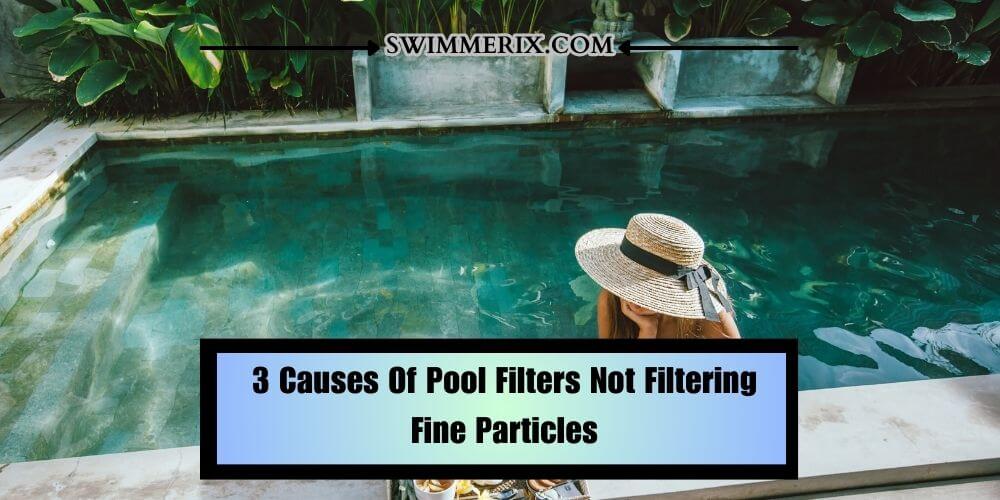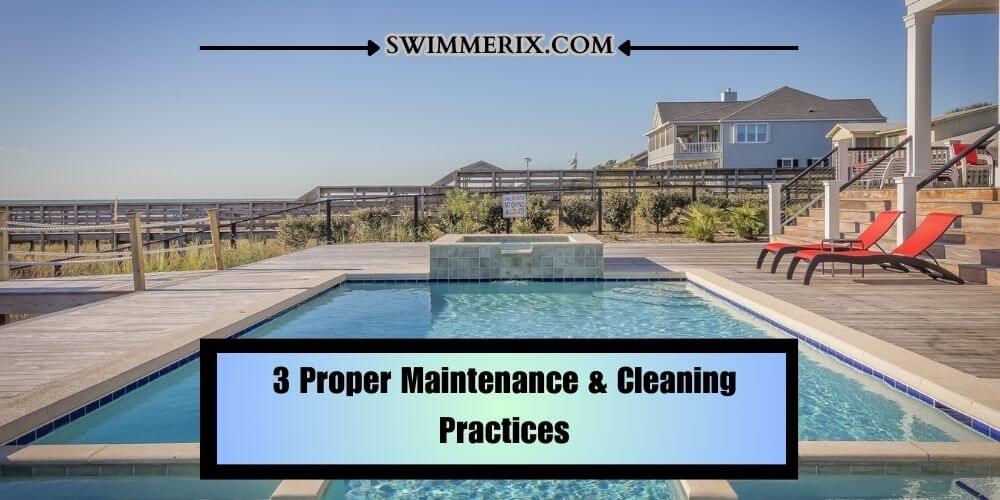
To maintain a clean & sparkling pool, it is important to have a well-functioning pool filtration & circulation system. A sparkling oasis is always a dream for every pool owner, but it becomes quite concerning when the pool filter fails to filter fine particles. Therefore, if you are wondering ‘why is my pool filter not filtering fine particles’ & what to do about it, this is the article for you.
In this guide, I will help you explain common reasons behind pool filter filling to filter fine particles, along with some practical solutions to address this issue. So without wasting time, let’s begin with learning: ‘Why is my pool filter not filtering fine particles.’
3 Causes Of Pool Filters Not Filtering Fine Particles

First, you need to determine what type of pool filter you have right now. Indeed, it can be quite frustrating when your pool filter fails to effectively remove fine particles, leaving the water cloudy & uninviting.
You need to know what type of pool filter you have to be able to troubleshoot it effectively. Mainly there are three types of pool filters: sand, cartridge & diatomaceous earth filters.
Sand filters & cartridge filters are not very effective in removing small fine particles like diatomaceous earth filters. Diatomaceous earth filters can filter can catch even the tiniest particle, resulting in exceptional filtration. According to Mountain Empire Community College, DE filters, known as diatomaceous earth filters, boast a straightforward operational process and excel in the task of eliminating various contaminants such as cysts, algae, and even asbestos from water sources
Therefore, if you have a sand or cartridge filter, switch to diatomaceous earth filters for exceptional filtration & circulation of your pool water. However, returning to the point below, you will find the following reasons behind your pool pump failing to filter out fine particles effectively.
Insufficient Filtration Media
One of the most common causes behind pool filters failing to filter fine particles is when filtration media becomes worn out or insufficient. Yes, with continuous usage, the filter media, whether sand, cartridge, or diatomaceous, starts to degrade & lose its effectiveness.
As a result, smaller particles will be able to escape filtration & remain suspended in the water, causing cloudiness. A study published in the Journal of environmental engineering claims that regular media replacement is necessary for maintaining optimal filtration process performance. The study also recommends replacing the filter media every 3-5 years, depending upon the type of filter & usage.
Incorrect Filter Size or Type
You may need to use the correct filter size or type. Yes, this can also be a major contributor to poor filtration of fine particles. If you have been using the wrong filter size or type for your pool, it will lead to poor filtration.
Choosing a filter that is very small in size or incompatible with your pool size may result in failing to remove fine particles effectively. Plus, it would help if you also considered the compatibility of the filter with your pool size & usage, which will directly impact its ability to remove fine particles as well. Many pool owners need to learn that they use undersized filters. This incorrect sizing will result in a reduced water flow rate and inadequate filtration.
Poor Maintenance & Cleaning
You may be neglecting the requirements of proper maintenance & regular cleaning to ensure the optimal performance of your pool filter, which is crucial. You should always pay attention to routine cleaning as it may lead to clogging & reduced filtration efficiency, allowing the fine particles to escape through the filter very conveniently.
60% of pool owners must pay more attention to the recommended filter cleaning frequency. Hence, if you also fail to clean the filter regularly, it will further lead to the accumulation of debris, oils & contaminants while hindering the filter’s ability to capture fine particles effectively.
If you want to prevent clogging and improve filtration, I will advise you to follow a proper cleaning & maintenance routine. It would help if you cleaned the filter according to the manufacturing guidelines. I usually like to backwash the sand filters. However, rinse or soak it regularly if you have cartridge or diatomaceous filters.
Solutions to Improve Pool Filter Performance
After understanding the common causes behind pool filters not filtering fine particles, it is time that we expose some practical solutions to improve their ability to filter fine particles effectively. Below I’m mentioning a few solutions that can help you troubleshoot this issue & get your pool pump filter back at its best function.
Upgrading Filtration Media
If you are continuously experiencing ongoing issues with fine particle filtration, consider upgrading your filtration media. Today, you can find many advanced options available in the market, like glass media or zeolite, which has gained popularity for its superior filtration capabilities compared to traditional sand or diatomaceous earth filters.
A study by the University Of California Perclay evaluated different filtration media & found that glass media give better output than traditional sand filters in terms of filtration efficiency for good articles. The study also reported removing 99% of particles as small as two macarons with glass media compared to 90% with sand.
Evaluating & Adjusting Filter Size & Type
Another thing you can do to ensure optimal filtration is evaluated & adjusting the filter size or type based on your pool-specific requirement. To do that effectively & ensure proper installation, you should consider consulting professional or pool experts.
They are the best person to provide valuable insights into selecting the right type of filter for your pool size & usage. There is a huge correlation between filter size & particle removal efficiency.
After doing my research, I learned that oversized filters will result in reduced filtration process & performance as larger particles can pass through without being captured. On the other hand, using an undersized filter may lead to increased pressure & decreased flow rate, compromising its ability to remove fine particles effectively.
- Few More Common Issue That You Might Encounter!
- Pool Pump Losing Prime Overnight
- Pool Sand Filter Not Filtering Algae
- Sand in Pool After Backwash
- Pool Pump Works on Recirculate but Not on Filter
- Pool Pump Loses Prime When Turned Off
Note: Paying attention on proper maintenance & cleaning practices will help you prevent these issues.
3 Proper Maintenance & Cleaning Practices

The above information has helped you get your pool filter back to its best performance & filtering fine particles. If yes, I am mentioning a few proper maintenance & cleaning practices that you should follow to prevent this issue from recurring and maximize filtration efficiency.
However, if the filter does not filter fine particles persists, contact a local pool service provider who can help you assess, determine, inspect, repair, or replace the filter properly. Now, look at three of the major maintenance & cleaning practices you should follow to maximize your pool pump filtration efficiency.
Regular Cleaning
First, determine what type of pool filter you have because each has its cleaning requirement. Therefore, make sure you are cleaning the filter according to the manufacturer’s recommendation.
If you use a sand filter, you must backwash it regularly to remove trapped debris. For cartridge or diatomaceous earth filters, you need to clean them by removing & releasing them thoroughly.
Cleaning Frequency
When determining the cleaning frequency, it particularly depends upon factors like environmental conditions and pool usage. As a general guideline, I like AIM to clean the filter at least once every one or two weeks.
However, if your pool rarely sees swimmers, you can aim to clean the filter at least once every 4-6 weeks. Or more frequently in case of heavy usage or high debris level.
Water Chemistry Balance
To prevent particle accumulation, you should also maintain proper water chemistry. Water chemistry ensures not only a safe swimming experience but also effective filtration.
Imbalanced water chemistry can lead to the formation of scale & algae, which can clog the filter. Therefore, use a reliable testing kit to regularly test & adjust parameters like PH alkalinity & sanitizer level to ensure balance water chemistry.
3 Additional Measures for Enhanced Filtration
Apart from the solution I mentioned above, there are a few supplementary measures to enhance the filtration of fine particles in your pool. For example, consider implementing a pre-filtering system or device that may reduce the strain on your main pool filter.
Pre-filtering also helps capture larger debris before it reaches the filter, allowing it to focus on effectively removing smaller particles. Some of the most popular pre-filtering options that you can include are as follows:
3 Pre-filtering Options
- Skimmers: Skimmers are common and generally installed in the pool circulation system. This act as a first line of defense against debris. They effectively collect leaves, insects, & larger particles before the water enters the main filter.
- Leaf Traps: Another great device is a leaf trap which you can attach & connect to pool cleaners or vacuum systems. It effectively captures large debris, preventing them from reaching the main filter. If you have trees & plants around your pool, consider installing leaf traps.
- Filter Socks: Filter socks are nothing but fabric or mesh socks that you place over the skimmer basket or pump filter to capture smaller particles & debris. Plus, it is very easy to clean & will significantly improve the life span of your main filter.
Supplemental Cleaning Methods
Do you know there are also many robotic pool cleaners available in the market known for their effectiveness in removing debris & fine particles from pool floors, walls & Water lines? Hence, it would help if you also considered supplementing your pool maintenance routine with additional cleaning methods to improve fine particle filtration.
Robotic pool cleaners can give you an average removal efficiency of 95% for particles as small as two macrons. Also, the robotic cleaners will significantly reduce their reliance on the main pool filter for fine particle removal, improving the filtration process and prolonging the main filter’s lifespan.
Conclusion
After reading this article, I hope you know why maintaining a clean & clear pool is a key aspect of pool ownership. I have given my best to give you & a proper understanding of why your pool filters are not filtering fine particles & what you can do about it.
If you implement all the suggested solutions, you can significantly improve your pool filtration performance. However, always remember to clean & maintain your pool filter and consider upgrading filtration media if required.
Also, ensure that the filter size & type is suitable for your pool. Over time, it’s not uncommon to notice inefficient filtration. Therefore, consider incorporating pre-filtering options & supplementary cleaning methods like robotic cleaner to enhance the fine particles filtration further.
Follow all these recommendations & conduct regular maintenance. You can enjoy crystal-clear water free from any unwanted particles for a safe & fun swimming experience.
If you find this article helpful, then consider sharing it. Your share will help many people learn why their ‘pool filter is not filtering fine particles’ & what they can do about it. Check my other helpful guide on pool care & maintenance shared on this website. See you in the next post, till then, take care & goodbye.

Hi, This is Josh. I am a former competitive swimmer and current fitness enthusiast.
I created this site to share my love of swimming with the world!
